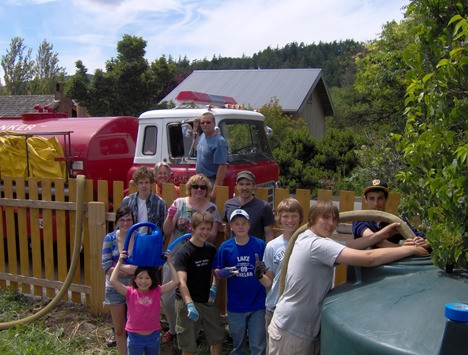Orcas teens experienced blacksmithing in a trial by fire at Orcas Island Forge last week.
“It was so hot, and we were next to the furnace, so it was double-hot!” said Orcas High junior Susanne Mietzner. “Everybody was sweating and it stunk so bad. It was so much fun to learn a new trade; every skill is worth keeping. It was like the stone age. It was a lot of fun. If I wasn’t doing this, I’d be on my computer all day. I’d be wasting my summer.”
Mietzner and other students enjoyed banging out spoons and hooks under the guidance of local blacksmith Jorgen Harle last week, July 5 and 6. The next day, the group hopped on their bikes and cars and caravanned out to Coffelts’ farm to learn about sheep farming.
These working field trips are part of this summer’s Farm Education and Sustainability for Teens (FEAST) program, now in its third year coordinated by Owen Cheevers and Whitney Hartzell. The program is open to all local high school students for school credit.
“These kids keep hearing that the world they’re living in is melting, so we want to provide them solutions… It’s so important that young people are learning these skills,” said Cheevers. “My hope is that they recognize their own power to have an impact on the world they live in, and contribute to positive socio-environmental solutions.”
“(We want to give them) a hope for the future that’s grounded in sustainable living skills,” said Hartzell. “They’re exposed to entire lifestyles and livelihoods that can help and aid the future of the planet instead of degrade it.”
Among this year’s adventures are trips to Bullocks’ Permaculture homestead, Taproot Farm, La Campesina Project for beekeeping, Waldron Island to learn about wild edibles with phycologist Dr. Ryan Drum, wood carving with Walter Henderson, a workshop on building rocket stoves, mycology with Cheevers and a solar installation with Eric Youngren. Activities run Monday through Wednesday from 10 a.m. to 4 p.m.
Cheevers said the FEAST program stands out among others of its ilk, and off-islanders have been “blown away” at the quality of the offerings.
“That’s a testament to this community,” he said. “Yeah, (Orcas) is a sleepy little town, but it has world class blacksmith, and farmers, and mycologists, and permaculturists…”
Cheevers also said it’s a priority for the students to learn to work well together as a close-knit team.
Past students have continued on to pursue sustainable agriculture interests sparked by the FEAST program; some taking summer work internships on farms visited during the program.
Nineteen kids attended last year, and 12 students are currently attending, with availability for more.
The students spent their first day clearing and planting the FEAST garden on North Beach Road, across from the Village Green. Teacher Carrie Schuh used her $500 Gladys M. Baggaley Memorial Award funds to purchase garden tools, and Smith and Speed Mercantile donated two garden forks as well. The students were excited to show off their new tools: a hori-hori, a kama hoe, a circle hoe and a kana hoe. The lot has no water access, so Mike Durlan of Deer Harbor’s PurRain donated the use of a 500 gallon water tank, and the Orcas fire department refills it with their tanker truck as needed.
Cheevers and Hartzell said highly skilled and generous Orcas Islanders make the program possible, saying, “it’s hugely community supported”. Many of the specialists donate their time to the program, although the group often provides some service in gratitude, like pulling thistles or packing wool into enormous sacks at Coffelts’.
The July 21 FEAST class on beekeeping with Rhonda Barbieri will be open to the public. Email Hartzell at whitney.hartzell@gmail.com to reserve a spot, $10-20 per person on a sliding scale. For more information, see www.feastprogram.org.



